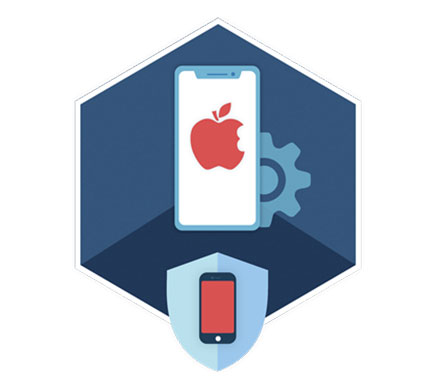
| Product Type |
|---|
Elcomsoft iOS Forensic Toolkit
Perform full file system and logical acquisition of iPhone, iPad and iPod Touch devices. Image device file system, extract device secrets (passwords, encryption keys and protected data) and decrypt the file system image.
- Full file system extraction and keychain decryption without a jailbreak
- Logical acquisition extracts backups, crash logs, media and shared files
- Passcode unlock and physical acquisition for legacy devices
- Extracts and decrypts protected keychain items
- Repeatable, forensically sound extraction for select iPhone and iPad models through modified bootloader
- Automatically disables screen lock for smooth, uninterrupted acquisition
Supports: all generations of iPhone, iPad, iPad Pro and iPod Touch, first-generation HomePod; Apple Watch and Apple TV 4 and 4K; all versions of iOS from iOS 3 to iOS 17
New features
Full low-level extraction with keychain decryption for iOS 16.0 – 16.6.1
Low-level file system extraction and keychain decryption are now available for a wider range of iOS versions than ever. Full low-level extraction is now available for iOS 16 through 16.6.1. The new methods support devices built with the A11 and newer chips, effectively covering the iPhone 8/8 Plus/iPhone X, as well as the iPhone Xs/Xr through iPhone 14/14 Pro range, and supports many iPads including those based on Apple M1 and M2 chips.
Enhanced support for legacy devices: mounting HFS images in Windows and Linux
The latest update enables Windows and Linux users to mount HFS disk images extracted from legacy Apple devices. This new capability empowers experts to efficiently process and analyze digital evidence extracted from legacy Apple devices on Linux and Windows-based computers.
Forensic Access to iPhone/iPad/iPod Devices running Apple iOS
Perform the complete forensic acquisition of user data stored in iPhone/iPad/iPod devices. Elcomsoft iOS Forensic Toolkit allows imaging devices’ file systems, extracting device secrets (passcodes, passwords, and encryption keys) and accessing locked devices via lockdown records.
The following extraction methods are supported:
- Advanced logical acquisition (backup, media files, crash logs, shared files) (all devices, all versions of iOS)
- Direct agent-based extraction (all 64-bit devices, select iOS versions)
- Forensically sound bootloader-based checkm8 extraction (select devices)
- Passcode unlock and true physical acquisition (select 32-bit devices)
See Compatible Devices and Platforms for details.
Multi-Platform Availability
iOS Forensic Toolkit is available for macOS, Windows, and Linux. Here’s how they compare feature-wise:
| Features | macOS | Windows | Linux* |
|---|---|---|---|
| Get extended device information | ✓ | ✓ | ✓ |
| Logical acquisition (iTunes-style backup) | ✓ | ✓ | ✓ |
| Extracting media files & metadata | ✓ | ✓ | ✓ |
| Extracting sysdiagnose logs | ✓ | ✓ | ✓ |
| Agent-based extraction with developer accounts | ✓ | ✓ | ✓ |
| Agent-based extraction with regular accounts | ✓ | ✕ | ✕ |
| Bootloader-based extraction | ✓ | ✕ | ✓ |
| Additional service features | ✓ | ✓ | ✓ |
The Linux edition officially supports Debian, Ubuntu, Kali Linux, and Mint.
Full File System Extraction and Keychain Decryption
A low-level extraction method based on direct access to the file system is available for a wide range of iOS devices and OS versions. Using an in-house developed extraction tool, this acquisition method installs an extraction agent onto the device being acquired. The agent communicates with the expert’s computer, delivering robust performance and extremely high extraction speed topping 2.5 GB of data per minute.
Using the extraction agents is inherently safe for the device itself as it neither modifies the system partition nor remounts the file system. The low-level extraction technique employed by the extraction agent yields as much data as that obtained through physical extraction methods like checkm8. Both the file system image and all keychain records can be extracted and decrypted depending on the OS version.
One can either extract the complete file system or use the express extraction option, only acquiring files from the user partition. By skipping files stored in the device’s system partition, the express extraction option helps reduce the time required to do the job and cut storage space by several gigabytes of static content.
Windows and Linux users will need an Apple ID registered in the Apple Developer Program to install and sign the extraction agent. Mac users may use a regular Apple ID for signing and sideloading the extraction agent.
Forensically sound extraction with bootloader exploit
To preserve digital evidence, the chain of custody begins from the first point of data collection to ensure that digital evidence collected during the investigation remains court admissible. The new, bootloader-based extraction method delivers repeatable results across extraction sessions. When using iOS Forensic Toolkit on a supported device, the checksum of the first extracted image will match checksums of subsequent extractions provided that the device is powered off between extractions and never boots the installed version of iOS in the meantime.
The new extraction method is the cleanest yet. Our implementation of bootloader-based exploit is built from the ground up. All the work is performed completely in the RAM, and the operating system installed on the device is not booted during the extraction process. Our unique direct extraction process offers the following benefits:
- Repeatable results. Checksums of subsequent extractions will match the first one if the device is kept powered off and never boots iOS between sessions.
- Supports iPhone X, iPhone 8/7/Plus, 6s/6/Plus, SE (original), iPhone 5s
- Supports a wide range of Apple models in total including 25 iPhones, 40 iPads, 3 iPods, 4 Apple TV and 4 Apple Watch models
- Wide iOS compatibility. iOS 3 through iOS 16 are supported (no support for iOS 16 on A11 Bionic iPhones).
- Unaltered system and data partitions.
- Zero data modification policy: 100% of the patching occurs in the RAM.
- The installation process is fully guided and extremely robust.
- Locked devices supported in BFU mode, while USB restricted mode can be completely bypassed.
Compatibility: bootloader-level extractions are available in the Mac and Linux editions.
Unlocking and Imaging Legacy Devices: iPhone 3G/3GS, 4, 4s, 5, and 5c
Passcode unlock and imaging support are available for legacy iPhone models.
The Toolkit can be used to unlock encrypted iPhone 3G/3GS, 4, 4s (1), 5 and 5c devices protected with an unknown screen lock passcode by attempting to recover the original 4-digit or 6-digit PIN. This DFU attack takes only 12 minutes to unlock an iPhone 5 protected with a 4-digit PIN, while 6-digit PINs will take up to 21 hours. A smart attack will be used automatically to attempt cutting this time as much as possible. In less than 4 minutes, the tool will try several thousand most commonly used passcodes such as 000000, 123456 or 121212, followed by 6-digit PINs based on the dates of birth. With 74,000 of those, the smart attack takes approximately 1.5 hours. If still unsuccessful, the full brute force of the rest of the passcodes is initiated.
Full physical acquisition is available for legacy iOS devices including the iPhone iPhone 3G/3GS, 4, 4s (1), 5 and 5c. For all supported models, the Toolkit can extract the bit-precise image of the user partition and decrypt the keychain. If the device is running iOS 4 through 7, the imaging can be performed even without breaking the screen lock passcode, while devices running iOS 8 through 10 require breaking the passcode first. For all supported models, the Toolkit can extract and decrypt the user partition and the keychain.
(1) The passcode unlock and forensically sound, checkm8-based extraction are available for the iPhone 4s, iPod Touch 5, iPad 2 and 3 devices via a custom flashed Raspberry Pi Pico board, which is used to apply the exploit. The firmware image is provided with iOS Forensic Toolkit; the Pico board is not supplied.
Notes: Mac and Linux editions only; iPhone 4s support requires a Raspberry Pi Pico board (not supplied) with custom firmware (supplied). For iOS 4 through 7, passcode recovery is not required for device imaging. For iOS 8 and 9, the passcode must be recovered before imaging (otherwise, limited BFU extraction available). Unlock speed estimates provided for the iPhone 5; attacks run slower on older devices.
Extended Logical Acquisition
iOS Forensic Toolkit supports logical acquisition, a simple and safe acquisition method. Logical acquisition produces a standard iTunes-style backup of information stored in the device, pulls media and shared files and extracts system crash logs. While logical acquisition returns less information than low-level extraction, experts are recommended to create a logical backup of the device before attempting more invasive acquisition techniques.
We always recommend using logical acquisition in combination with low-level extraction for safely extracting all possible types of evidence.
Quickly extract media files such as Camera Roll, books, voice recordings, and iTunes media library. As opposed to creating a local backup, which could be a potentially lengthy operation, media extraction works quickly on all supported devices. Extraction from locked devices is possible by using a pairing record (lockdown file).
In addition to media files, iOS Forensic Toolkit can extract crash/diagnostics logs and stored files of multiple apps. Extract Adobe Reader and Microsoft Office locally stored documents, MiniKeePass password database, and a lot more. The extraction requires an unlocked device or a non-expired lockdown record.
Logical acquisition is available for all devices regardless or hardware generation and version of iOS. Experts will need to unlock the device with passcode or Touch ID, or use a non-expired lockdown file extracted from the user’s computer.
If the device is configured to produce password-protected backups, experts must use Elcomsoft Phone Breaker to recover the password and remove encryption. If no backup password is set, the tool will automatically configure the system with a temporary password (“123”) in order to be able to decrypt keychain items (password will be reset after the acquisition).
Supported Devices and Acquisition Methods
iOS Forensic Toolkit implements low-level extraction support for devices ranging from the iPhone 3G through iPhone 14, 14 Pro and iPhone 14 Pro Max range.
The following compatibility matrix applies:
- Passcode unlock: Brute-forces 4-digit and 6-digit screen lock passcodes via DFU exploit. All iOS versions, iPhone 3G/3GS, 4, 4s, 5 and 5c devices. [1][2]
- Legacy devices: Bit-precise imaging and decryption of iPhone 3G/3GS, 4, 4s, 5 and 5c devices. [1][2]
- Agent: Full file system extraction and keychain decryption for many devices running iOS 12 through 16.5. The corresponding iPad models are also covered. Apple Developer registration required (Windows)/optional (macOS).
- Via Bootrom exploit (checkm8): Forensically sound file system & keychain acquisition for 76 Apple devices for all supported iOS versions. [1]
- Other Apple devices: Advanced logical acquisition, shared files and media extraction for devices running versions of iOS not supported by the extraction agent. Device must be unlocked and paired with the expert’s computer.
Perform physical and logical acquisition of iPhone, iPad and iPod Touch devices. Image device file system, extract device secrets (passwords, encryption keys and protected data) and decrypt the file system image.
- Only available in the Mac and Linux editions.
- iPhone 4s support requires a custom-flashed Raspberry Pi Pico board.

Elcomsoft iOS Forensic Toolkit for macOS. Keychain decription
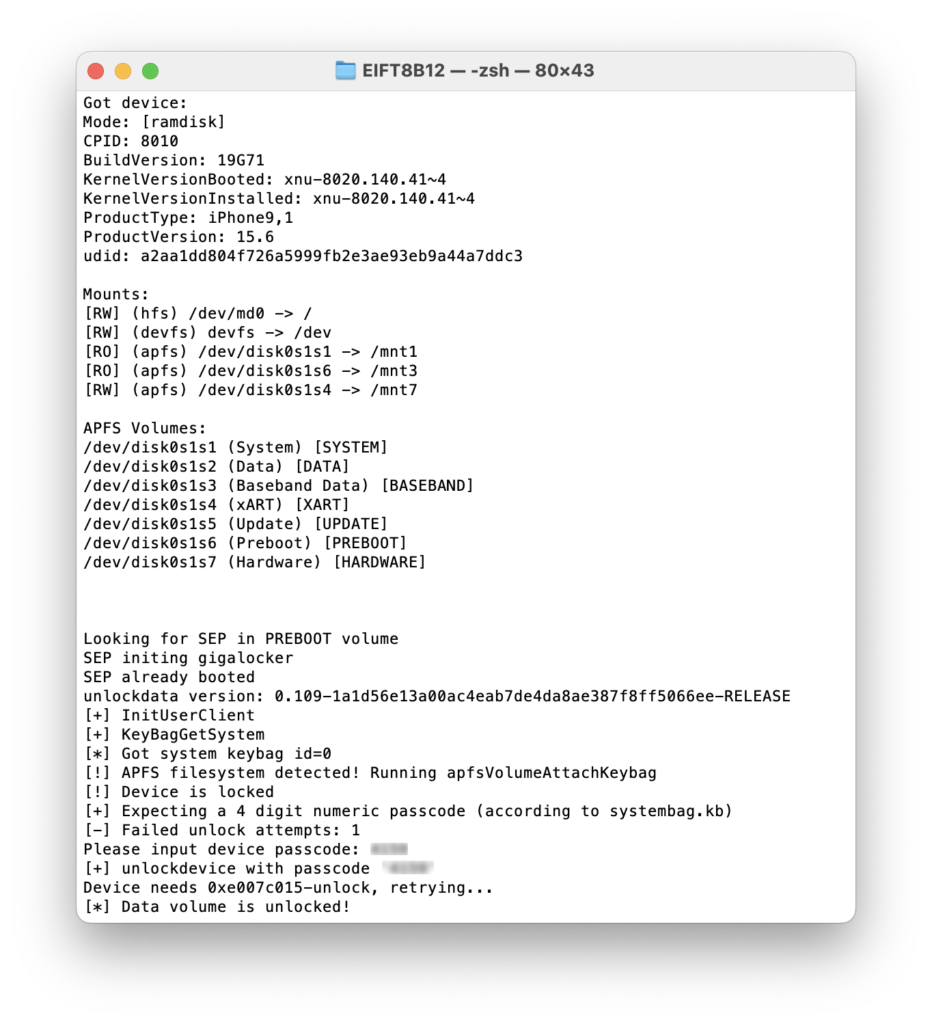
Elcomsoft iOS Forensic Toolkit for macOS. Unlocking the APFS
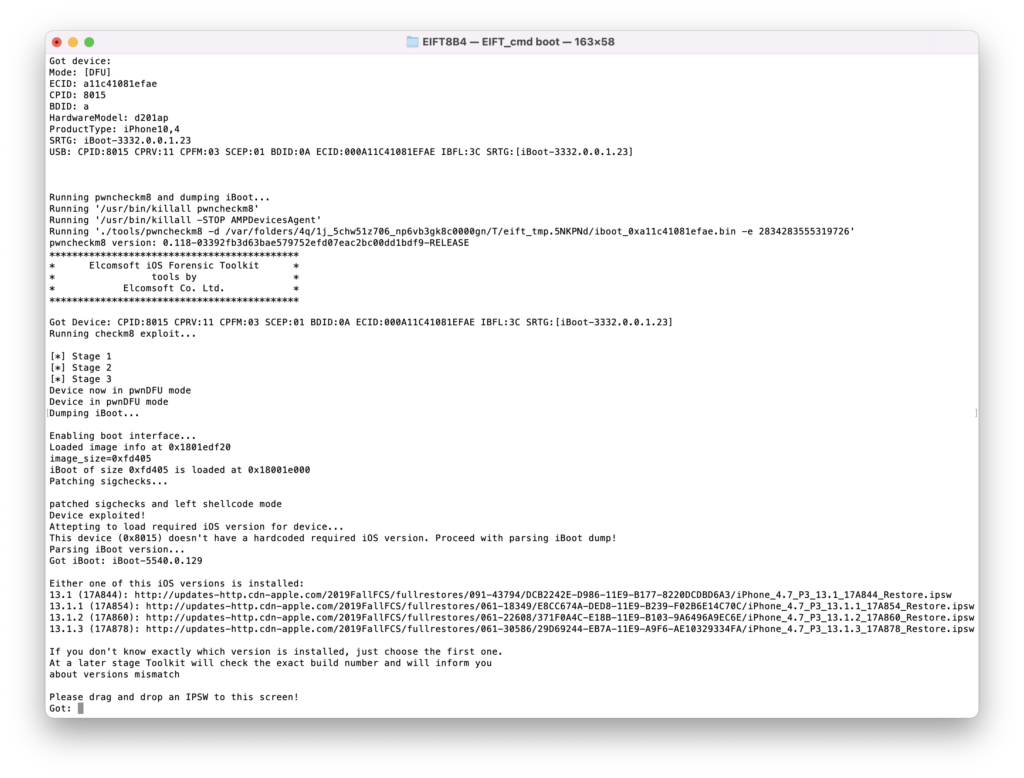
Elcomsoft iOS Forensic Toolkit for macOS. Applying checkm8 exploit to the device.

Elcomsoft iOS Forensic Toolkit for Windows. Keychain extraction.

Elcomsoft iOS Forensic Toolkit for Windows. Full File System acquisition.
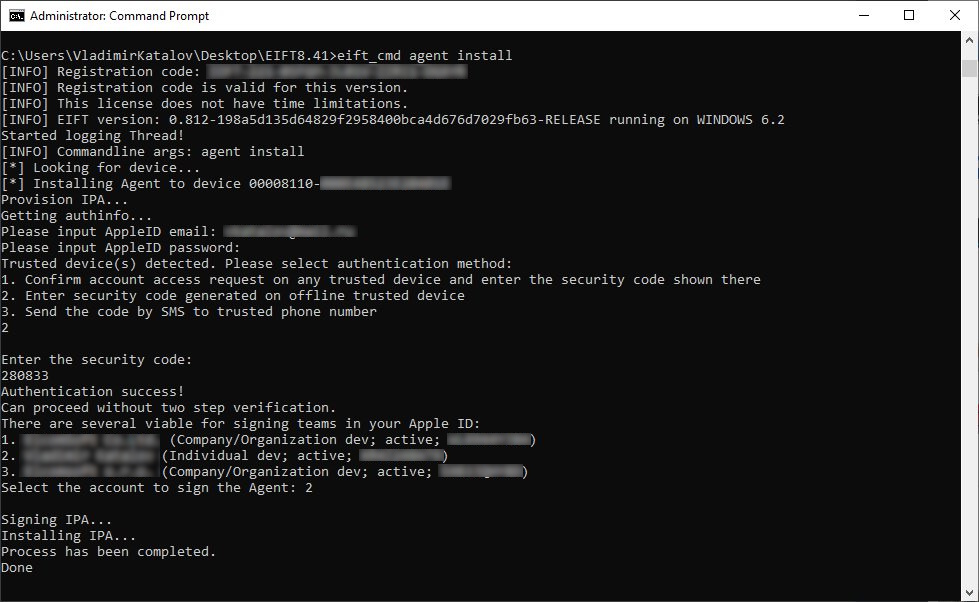
Elcomsoft iOS Forensic Toolkit for Windows. Agent installation.
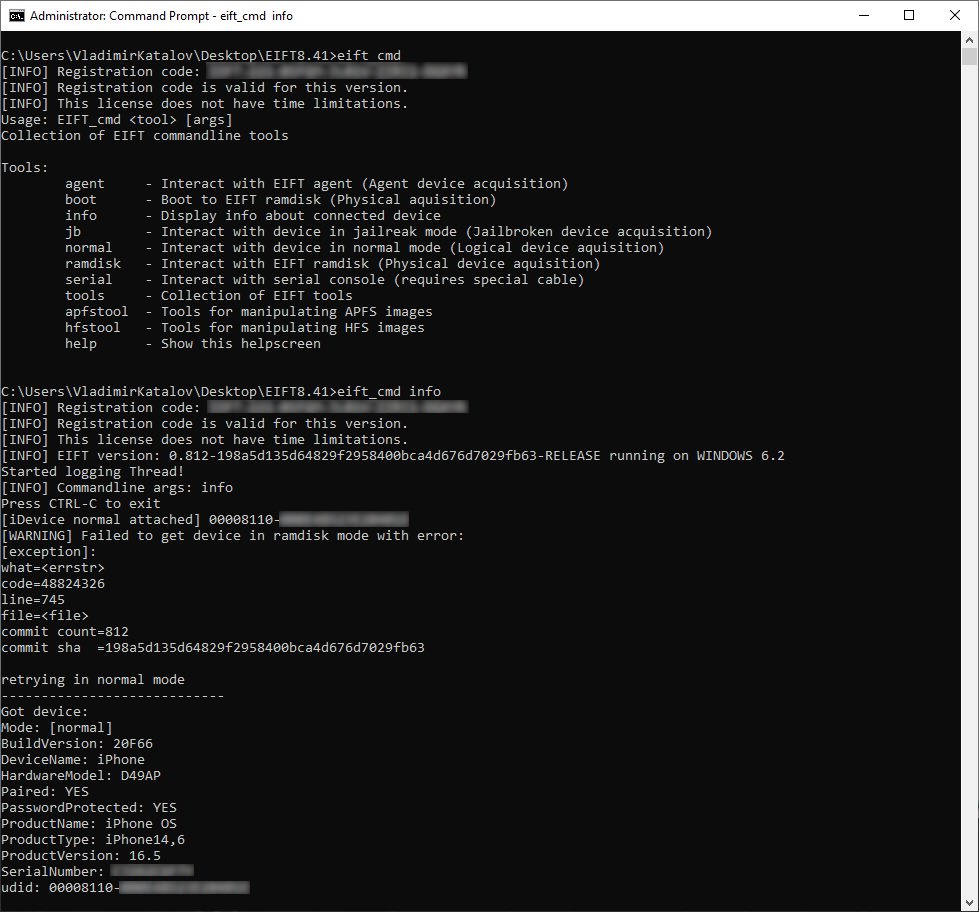
Elcomsoft iOS Forensic Toolkit for Windows. Information about device.
All Features and Benefits
Apple Watch, Apple TV and HomePod Extraction
Elcomsoft iOS Forensic Toolkit is the only third-party tool on the market to extract information from Apple TV, Apple Watch and first-generation HomePod devices. While experts may attempt creating an iTunes-style backup of the user’s iPhone paired with their Apple Watch, a local backup may not be available if the iPhone is securely locked. Extracting information directly from the Watch allows accessing information even if the iPhone is locked or unavailable. While Apple Watch does not offer standalone iTunes-style backups, experts can still access crash logs and media files including EXIF and location data.
- A third-party IBUS adapter is required to connect the Watch
- checkm8 extraction for Apple Watch S0 through S3
- Logical acquisition for Apple Watch S0 through S6
Apple TV devices have no support for iTunes-style backups, but may contain a local copy of the user’s entire iCloud Photo Library if the user enabled iCloud Photos in their iCloud account. Since Apple TV does not feature passcode protection, the extraction is possible even if the user’s iPhone is locked down and the iCloud password is unknown. Requires wired connection for Apple TV 4, wireless connection through Xcode for Apple TV 4K.
Forensically sound checkm8 extraction is supported for Apple TV 4K (1st gen) and older and Apple Watch S3 and older devices as well as the first-generation HomePod. A custom adapter may be required.
Keychain Extraction
Elcomsoft iOS Forensic Toolkit can extract keychain items including those protected with ThisDeviceOnly attribute, opening investigators access to highly sensitive data such as login/password information to Web sites and other resources (and, in many cases, to Apple ID).
The device must remain unlocked during the entire keychain acquisition process. iOS Forensic Toolkit implements a tool to disable automatic screen lock.
DFU, Recovery and Diagnostic Modes
Get information on locked and disabled devices through DFU, Recovery, and Diagnostic modes. Even if the device is locked after 10 unsuccessful unlock attempts, or if the USB restricted mode is activated, you can still switch it into Recovery or DFU. With Elcomsoft iOS Forensic Toolkit, you can then extract vital information about the device, including the device model identifier, its ECID/UCID, serial number and, in certain scenarios, the IMEI number. In addition, the Recovery mode returns information about the bootloader version, which helps determine the version of iOS or the range of versions of iOS installed on the device.
Automation Using Raspberry Pi Pico
Using a Raspberry Pi Pico board flashed with ElcomSoft firmware one can automate some otherwise time-consuming and labor-intensive routines.
Auto-DFU
Auto-DFU allows experts to automate the switching of iPhone 8, iPhone 8 Plus, and iPhone X devices into DFU, greatly simplifying the process that otherwise requires a sequence of button presses with precise timings. Automatic DFU mode is indispensable when one has a device with broken buttons, which would otherwise require disassembly to be placed into DFU. This feature requires the use of a pre-programmed Raspberry Pi Pico device.
Scrolling screenshots
This automation allows making long, scrollable screen shots in a semi-automatic fashion. This feature is available for all devices and versions of iOS.
Capturing screenshots can be a crucial step in mobile device investigations. By taking a series of screenshots of what is displayed on a connected iOS device, investigators can gather digital evidence that may not be accessible through other means, such as advanced logical acquisition, where the data such as protected chat histories may not be available. In a way, the new feature can be viewed as new extraction tool in addition to cloud, advanced logical, and low-level extraction methods.
Functional firewall for securing agent sideloading
Sideloading and running the low-level extraction agent may require validating the app’s digital signature through Apple servers, which requires online connectivity with associated risks. We have developed an open-source solution based on a Raspberry Pi 4 that minimizes the risks by limiting the device’s connection solely to the server required for certificate verification.



